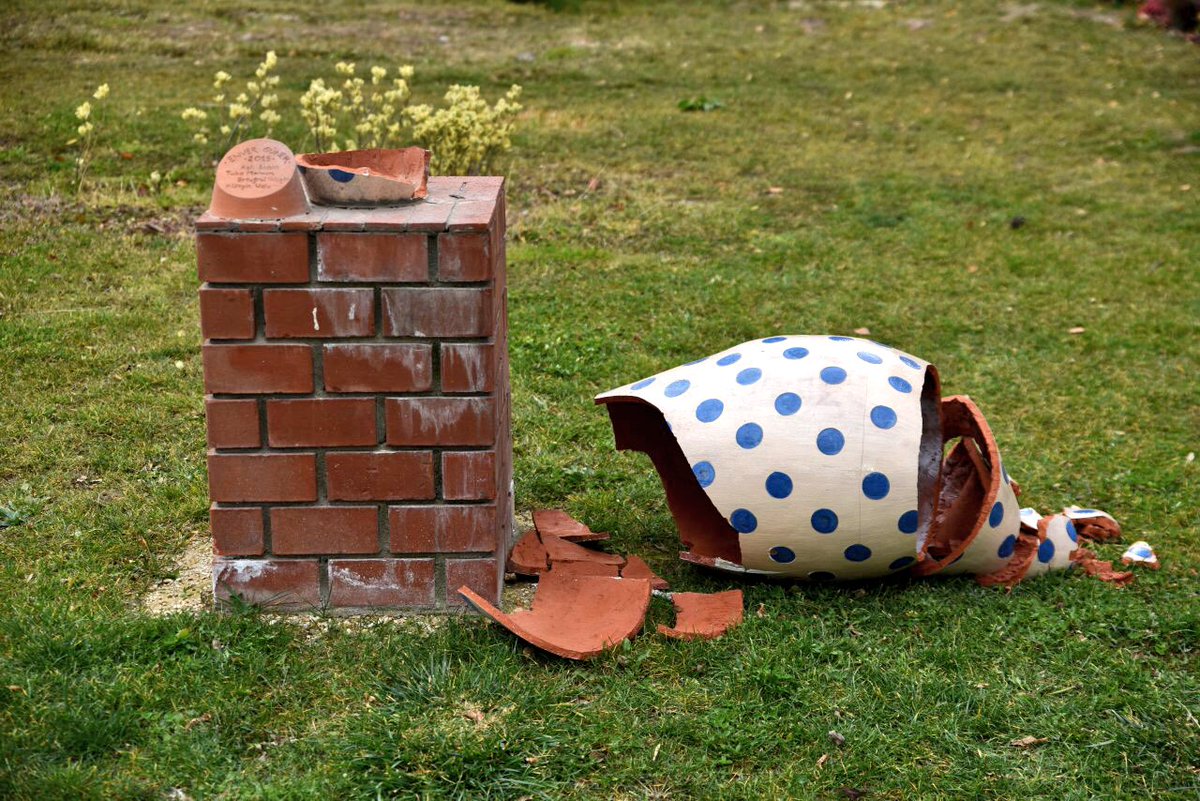Censorship, Liberation, and a Hope for Imece
by Tarık Günersel / December 21, 2017 / No comments

Art by Turkish artists destroyed by Islamic fascists in Eskisehir. Image and caption provided by the author.
Turkish TV Cuts Broadcast on Earthquakes
The supposedly autonomous but in fact government controlled TRT (Turkish Radio Television) censured Professor Ahmet Ercan’s talk about the earthquakes in Islam-oriented countries: “It is a sad fact that eighty percent of the people who die in earthquakes are from Islamic countries; because there is neither democracy nor scientific and technological applications.” The live interview was conducted after the earthquake on the Iraqi border of Turkey on November 13th. The moment Prof. Ercan (‘Er-jun’) made that comment the program presenter thanked him abruptly and cut the broadcast. Afterwards, Prof Ercan laughed and said that he was sure he would never ever be invited to TRT again. (Cumhuriyet, 12 Dec 2017)
Self-Censorship
In Turkey, Wikipedia is still blocked. Recently, 186 writers and journalists have been invited to participate in a poll. The result has been announced: 91% of us argue that censorship has increased greatly during the past decade; 93% of us admit that self-censorship has also increased considerably.
My Case
My wife often cautions me regarding my tweets saying: “Your grandchildren love you and need you. Write responsibly! Some of your friends are in jail, some are self-exile, and some simply do not mention anything political on Facebook or via Twitter.”
My daughter is also worried. My friends ask me not to show my anger. When I am interviewed on TV, I express my thoughts with careful wording.
I refuse to internalize the oppression and censorship, but I cannot say I do not care about certain possible consequences. Unofficial, authentic reactions are more likely and dangerous than official, scripted reactions. You may simply be made a target and provoke violence.

- Life is words in action, literature is action in words.
- Humans are about to destroy their spaceship Earth. Some of them are aware of this and they try to change the course of events. Will they succeed? Will more humans be alarmed and do something?
- Literature is vital and translators are messengers of world peace.
- Though I shall focus on the literary scene in Turkey and its problems regarding freedom of expression, I shall not omit the other parts of our planet. Today local is global and vice versa.

- Poet, playwright, actor, and director Tarık Günersel worked at Istanbul City Theater as a dramaturg.
- His works include Breaths of Infinity (a mosaic of poems) and My 300th Birthday Speech (short stories). His Becoming consists of his aphorisms and various ideas from world wisdom.
- His plays include Billennium, Nero and Agrippina, Sociology of Shit, Threat and Virtually Yours. He has written four libretti for the composer Selman Ada: Ali Baba & 40, Blue Dot, Forbidden Love, and Another Planet. His translations into Turkish include works by Arthur Miller, Samuel Beckett, Vaclav Havel and Savyon Liebrecht. His presentation of World Poetry Day to PEN International in 1997 led to its adoption by UNESCO. As the former president of PEN Turkey Center he was elected to PEN International Board in Tokyo from 2010 to 2012. In 2013 he initiated the Earth Civilization Project with the collaboration of several intellectuals from around the planet.
Your Case
I have left this section blank for you to fill in. What are moments that you have censored yourself?
Liberation vs Freedom
Two similar words, but “Liberation” implies a process, or a continued fight, whereas “Freedom” has a static connotation. History, if not our own lives, shows the vitality of constant struggle to enlarge our horizons and possibilities. Democracy, rights, freedom of thought and expression- all need our constant efforts.
Proto-civilizations
I have recently decided to refer to all the so-called civilizations “proto-civilizations.” The current Earth Civilization, which is in progress without any guarantees, already has countless roots, some of which were born in proto-civilizations.
Is all self-censorship bad by definition? Or is a healthy dose needed for self-discipline? What is the dividing line between self-censorship and a considerate attitude in terms of ubuntu– mutual helpfulness and cooperation?
A Turkish Word: İmece (e-ma-ja)
Imece means “voluntary collective construction.” Similar words may exist in all cultures. In English “cooperation” is a bit close to it, but not quite. Ubuntu is also close, but not quite. Emaja (imece in Turkish spelling) embraces the concept of construction or building: voluntary efforts in relation to a project. It is a voluntary co-building. How could I describe my position? I’m an Earthist Co-Builder. In Turkish: Dünyacı-İmececi. Just like the word ubuntu I hope imece will become widespread.
Happy 12018?
I hope secular democratic values will increasingly replace religious myths and beliefs. We need science (including a culture open to discussion and revision) and more efficient global cooperation. Adding 10 millennia to our current year to account for the way that movements and changes in the Earth’s climate paved the way to agriculture and to proto-civilizations, we are approaching the year 12018, which I prefer to write with a plus sign prior to it: +12018. After all, our universe is about 13.750 billion years old, and I do not wish to exclude that huge amount of time. The plus sign is helpful.
The year +12018 can be neither happy nor unhappy. There is no such subjective entity, but our good wishes are free of charge. And so, in +12018, may fruitful energies interact, and may contributions lead to contributions.




